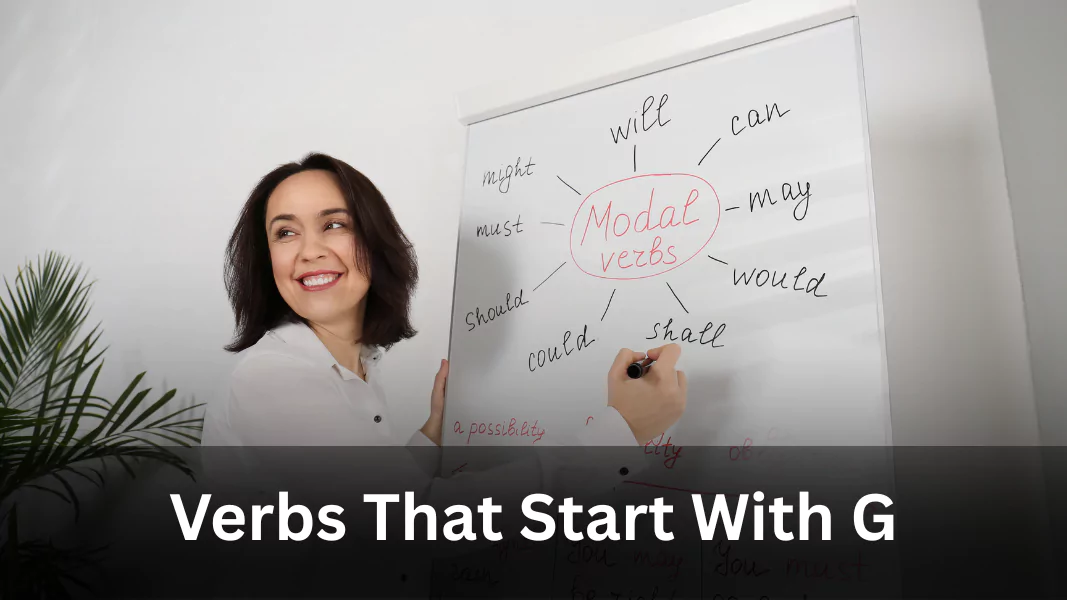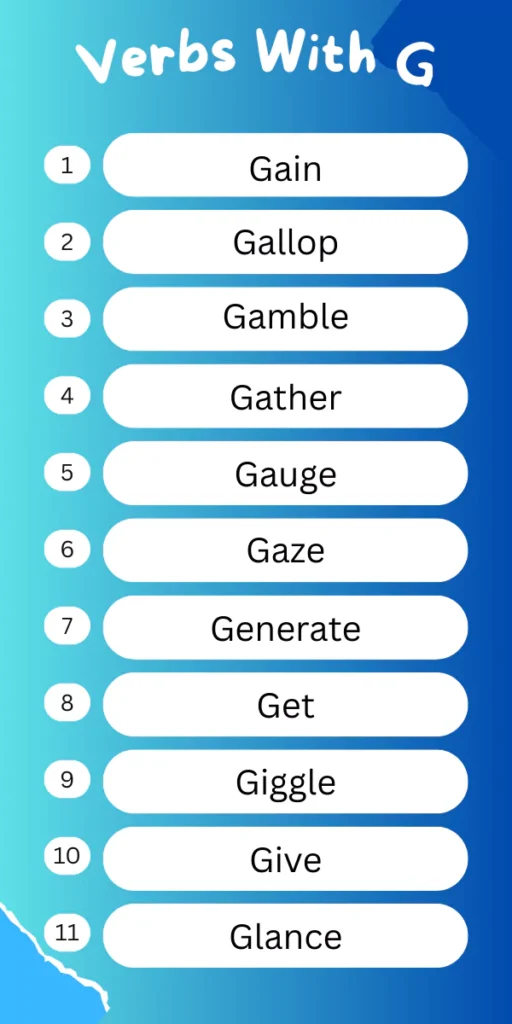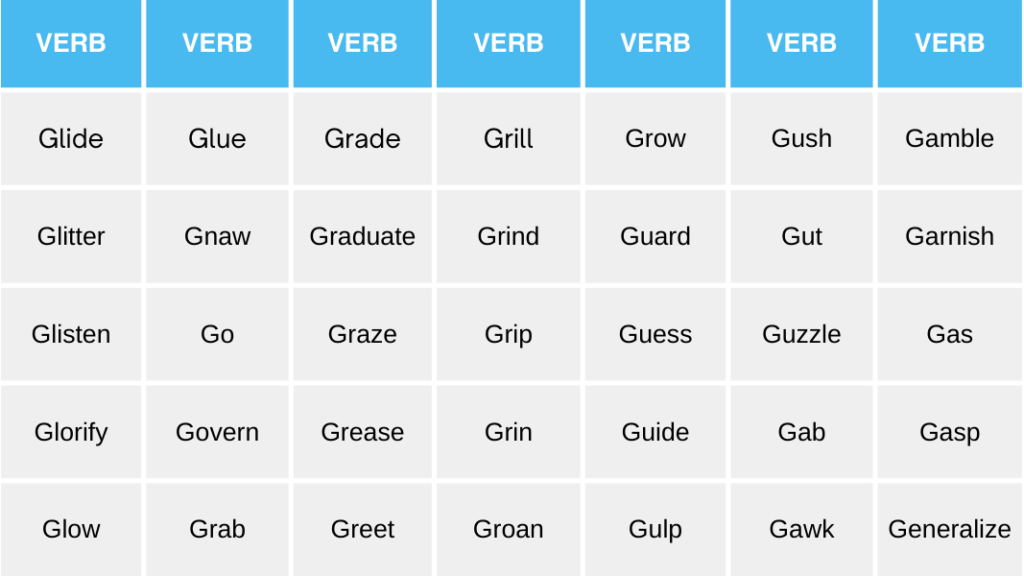Verbs That Start With G – List, Meanings & Examples in English

Verbs that start with G add power, energy, and versatility to the English language. From everyday actions like go and give to uplifting words such as grow, glow, and galvanize, these verbs bring precision and vibrancy to both spoken and written communication. Whether you’re looking to expand your vocabulary, enrich your writing, or simply find the perfect word to express action, G-verbs offer a wide range of choices. In this guide, you’ll discover comprehensive lists of action verbs, positive verbs, and impactful examples starting with G.
List of Verbs That Start With G
The letter G introduces a wide range of verbs that capture both simple and complex actions. From basic everyday words like go and give to more expressive choices such as gather, glide, and glorify, verbs beginning with G can enrich your vocabulary and communication. Below is a comprehensive list of G-verbs along with their meanings and examples to help you use them effectively in writing and speech.

Common Verbs Starting With G
- Go – to move from one place to another.
Example: She will go to the market tomorrow. - Give – to hand something to someone.
Example: He will give her a gift. - Get – to receive or obtain.
Example: I need to get some rest. - Grow – to increase in size or develop.
Example: Plants grow quickly in the summer. - Guess – to form an opinion without certainty.
Example: Can you guess the answer? - Gather – to collect together.
Example: They gather fruit every morning. - Grab – to seize suddenly.
Example: She tried to grab the ball. - Glow – to shine softly.
Example: The lamp began to glow in the dark. - Greet – to welcome someone politely.
Example: He greeted his friends with a smile. - Guard – to protect from danger.
Example: Soldiers guard the border. - Grin – to smile broadly.
Example: The child grinned with excitement. - Guide – to lead or show the way.
Example: The teacher will guide the students. - Glance – to look quickly.
Example: She glanced at her watch. - Grant – to give or allow something officially.
Example: The manager granted him permission. - Groan – to make a low sound of pain or displeasure.
Example: He groaned after lifting the heavy box.
Positive Verbs Starting With G
| Verb | Meaning | Example |
|---|---|---|
| Glow | to shine with light or happiness | Her face glowed with joy. |
| Grow | to develop or improve | He grew more confident over time. |
| Gratify | to give pleasure or satisfaction | The results gratified the teacher. |
| Glorify | to praise or honor greatly | The poem glorifies nature. |
| Give | to offer generously | She loves to give her time to charity. |
| Greet | to welcome warmly | They greeted the guests cheerfully. |
| Guide | to lead and support | The mentor guided her students well. |
| Galvanize | to inspire or excite into action | The speech galvanized the team. |
| Grant | to allow or bestow kindly | He granted her wish with a smile. |
| Gladden | to make someone happy | The surprise gladdened her heart. |
| Generate | to produce or create something good | The plan generated hope among workers. |
| Gift | to present as a token of love | They gifted books to the children. |
| Guarantee | to promise or assure positively | The company guarantees satisfaction. |
| Giggle | to laugh lightly with joy | The kids giggled during the show. |
| Glisten | to shine brightly with beauty | The morning dew glistened on the grass. |
Action Verbs Starting With G
- Go – to move or travel.
Example: They go jogging every morning. - Grab – to take hold of suddenly.
Example: He grabbed his coat and left. - Gallop – to run fast (for a horse).
Example: The horse galloped across the field. - Gather – to collect things.
Example: Children gathered flowers in the garden. - Grind – to crush into smaller pieces.
Example: She ground the coffee beans. - Glide – to move smoothly.
Example: The skater glided across the ice. - Gulp – to swallow quickly.
Example: He gulped down the water. - Gasp – to breathe suddenly in surprise.
Example: She gasped at the shocking news. - Grope – to feel with hands in the dark.
Example: He groped for the light switch. - Gaze – to look steadily at something.
Example: They gazed at the stars. - Gesture – to signal with hand movements.
Example: He gestured for her to sit down. - Grapple – to struggle or wrestle.
Example: The wrestlers grappled fiercely. - Generate – to create or bring about.
Example: The engine generates electricity. - Grumble – to complain in a low voice.
Example: He grumbled about the long wait. - Gnaw – to chew continuously.
Example: The dog gnawed on a bone.
Regular Verbs That Start With G
| Verb | Meaning | Example |
|---|---|---|
| Gain | to increase or acquire | She gained valuable experience. |
| Gallop | to run fast (horse) | The horse galloped across the field. |
| Gasp | to breathe in suddenly | She gasped at the surprise. |
| Gather | to collect | They gathered around the fire. |
| Gaze | to look steadily | He gazed at the painting. |
| Glance | to look quickly | She glanced at the clock. |
| Glide | to move smoothly | The bird glided across the sky. |
| Glow | to shine softly | The candle glowed in the dark. |
| Greet | to welcome | They greeted the guests warmly. |
| Grin | to smile widely | He grinned at the joke. |
| Groan | to make a sound of pain | The patient groaned loudly. |
| Guard | to protect | The police guarded the entrance. |
| Guess | to estimate without certainty | Can you guess the answer? |
| Guide | to show the way | She guided the tourists. |
| Grumble | to complain softly | He grumbled about the delay. |
Irregular Verbs Starting With G
- Go (went, gone) – to move from one place to another.
Example: She went to school early. - Get (got, gotten/got) – to obtain or receive.
Example: He got a new job last week. - Give (gave, given) – to present or hand over.
Example: They gave her a bouquet. - Grow (grew, grown) – to increase in size or develop.
Example: The baby has grown fast. - Grind (ground, ground) – to crush into small pieces.
Example: She ground the pepper finely. - Goose (goosed, goosed – informal, sometimes irregular) – to prod playfully.
Example: He goosed his friend as a prank. - Gainsay (gainsaid, gainsaid) – to deny or contradict.
Example: No one could gainsay the truth. - Gut (gut, gutted – irregular in sense of removing innards) – to remove the inside of.
Example: They gutted the fish. - Grip (gripped, gripped / sometimes grip, gript) – to hold tightly.
Example: She gripped the rope firmly. - Gaslight (gaslit, gaslit) – to manipulate someone psychologically.
Example: He gaslit her into doubting herself. - Ghostwrite (ghostwrote, ghostwritten) – to write for someone else secretly.
Example: She ghostwrote the memoir. - Goose-step (goose-stepped, goose-stepped – irregular in origin) – to march stiffly.
Example: The soldiers goose-stepped in formation. - Gird (girt/girded, girt/girded) – to prepare or encircle.
Example: They girded themselves for battle. - Gild (gilded/gilt, gilded/gilt) – to cover with a thin layer of gold.
Example: The craftsman gilt the frame. - Gas (gassed, gassed – but irregular when slang for “gaslit”) – to poison or fuel.
Example: The car was gassed up before the trip.
Phrasal Verbs Starting With G
| Verb | Meaning | Example |
|---|---|---|
| Give up | to quit or stop trying | He gave up smoking. |
| Give in | to surrender or yield | She finally gave in to his request. |
| Give away | to donate or reveal | They gave away free books. |
| Give back | to return something | She gave back the borrowed pen. |
| Give off | to emit (smell, light, heat) | The flowers give off a sweet fragrance. |
| Give out | to distribute or stop functioning | The teacher gave out the papers. |
| Go on | to continue | The show must go on. |
| Go over | to review carefully | Let’s go over the report again. |
| Go through | to experience or examine | She went through a tough time. |
| Go after | to pursue | He went after his dreams. |
| Go ahead | to proceed | Go ahead with your plan. |
| Go back | to return | He went back home. |
| Go up | to increase | Prices went up last year. |
| Go down | to decrease or descend | The sun went down slowly. |
| Go out | to leave or extinguish | The fire went out suddenly. |
Rare and Unique Verbs Starting With G
- Gainsay – to deny or contradict.
Example: He could not gainsay the evidence. - Gambol – to skip or jump playfully.
Example: The lambs gamboled in the meadow. - Gesticulate – to express with gestures.
Example: He gesticulated wildly during the debate. - Glower – to glare angrily.
Example: She glowered at the rude comment. - Grumble – to complain softly.
Example: He grumbled about the rain. - Grovel – to act in a humiliating manner.
Example: The servant groveled before the king. - Galumph – to move clumsily.
Example: The dog galumphed through the mud. - Gasconade – to boast extravagantly.
Example: He gasconaded about his victories. - Gormandize – to eat greedily.
Example: They gormandized at the feast. - Guttle – to devour greedily.
Example: He guttled the meal without manners. - Gnash – to grind teeth angrily.
Example: She gnashed her teeth in frustration. - Glissade – to slide gracefully (dance/ski).
Example: The skier glissaded down the slope. - Guttle – to gulp food noisily.
Example: The child guttled his dessert. - Gainsay – to oppose or deny.
Example: None dared gainsay the leader. - Gesticulate – to use gestures instead of words.
Example: He gesticulated to explain directions.
Popular & Impactful Verbs That Start With G
| Verb | Meaning | Example |
|---|---|---|
| Grow | to increase or develop | Her business grew rapidly. |
| Give | to offer or donate | They gave their time generously. |
| Go | to move or proceed | He goes to the gym daily. |
| Guide | to direct or lead | The teacher guided the class carefully. |
| Galvanize | to inspire into action | The leader galvanized the crowd. |
| Generate | to produce or create | The project generated new jobs. |
| Grant | to allow or bestow | The government granted permission. |
| Glow | to shine or radiate | Her smile glowed with warmth. |
| Gather | to collect together | The family gathered for dinner. |
| Gratify | to satisfy or please | Her success gratified her parents. |
| Greet | to welcome warmly | They greeted him with applause. |
| Guard | to protect | The police guard the city. |
| Ground | to base or establish firmly | Her argument was grounded in facts. |
| Guarantee | to assure or promise | This warranty guarantees safety. |
| Glorify | to praise or honor | The song glorifies freedom. |

Fun Facts About Words Beginning With G
- One of the Oldest Verbs – The verb “go” is one of the oldest words in the English language, tracing its roots back to Old English gān, and is still one of the most frequently used verbs today.
- Positive Vibes – Many G-verbs carry uplifting or motivational energy, such as grow, glow, galvanize, and give, which makes them favorites in speeches, self-help writing, and inspirational quotes.
- Double Meanings – Some G-verbs can shift dramatically depending on context. For example, ground can mean “to punish someone by restricting movement” or “to base something on facts.”
- Animal Influence – Several G-verbs come from animal behavior: gallop (horses), gobble (turkeys), and gnaw (rodents). These verbs bring vivid imagery into everyday language.
- Rare & Quirky Origins – The playful verb “gambol” (to skip or frolic) comes from the Italian gambata, meaning “a leg kick,” showing how language borrows and transforms across cultures.
Read: Verbs That Start With F
FAQs
Conclusion
Verbs that start with G bring power, variety, and positivity to the English language. From simple everyday actions like go and give to more impactful words like grow, glow, and galvanize, these verbs enrich both written and spoken communication. Whether you are a student, writer, or language enthusiast, learning G-verbs expands your vocabulary, makes your expression more precise, and adds depth to conversations. Keep practicing them with examples, and soon these words will become a natural part of your speech and writing.
